SUMMARY
This is AI generated summarization, which may have errors. For context, always refer to the full article.
![[Only IN Hollywood] Some of 2023’s best performances — overlooked or least hyped](https://www.rappler.com/tachyon/2023/12/underrated-actors-2023.jpg)
LOS ANGELES, CA – Leonardo DiCaprio, Bradley Cooper, and Cillian Murphy are A-list names landing on best actor lists everywhere. This week, I’m featuring several actor contenders who are not yet household names and those who are already well-known but are somehow either not getting those major nominations or are quietly gaining ground.
These actors gifted us with their performances that stand out in a bumper year of nuanced portrayals and good films. These quotes, culled from our virtual press conferences and Q&As, were edited for clarity and brevity.
Andrew Scott and Paul Mescal – All of Us Strangers

In Andrew Haigh’s metaphysical drama, loosely adapted from Taichi Yamada’s 1987 novel Strangers, Scott (using last names in this instance to distinguish the actor and director) and Paul play star-crossed gay lovers.
Scott, perennially known as “the hot priest” in the Fleabag series, is devastating as Adam, a lonely screenwriter who encounters his parents (Jamie Bell and Claire Foy) – strange since they died when he was 12 – and meets a mysterious neighbor, Harry (Paul).
Scott is unforgettable in the lead role but Paul deserves recognition in this haunting tale of loss, grief, and ghosts. The duo’s sex scenes are tender and realistic, pivotal in this melancholic romance drama and meditation on loneliness.
Paul recalled shooting the intimate scenes with Scott: “I think it was a week in there when we did a good solid chunk of sex scenes. We shot our stuff in bed in four weeks and most of that was in a studio set up in West London. But I think it was one week that was particularly sex-heavy.”
In their first kissing scene, which looks so spontaneous, Scott’s Adam admits that he forgot to breathe. Scott revealed, “Oh, that was in the script.”
Asked what they were eating in the scene before their first kiss, Paul answered, “It was cake mixture and water. Icing sugar and cake mixture. The thing that I was fixated on was like, what is that going to be? I actually tested it before props came in and I was like, oh, this is what it is.”
“And it also came to a junction in the filming process where we’d gotten, like, we were giddy and we were doing close-up.”
“I think it was one of the last scenes we shot on a Friday and I was just like, ‘Andrew, we’ll just do this a couple of times and laugh about it after.’ Because I felt if we started laughing during the scene, we wouldn’t get anywhere.”
Scott said, “But sex scenes are really weird. Andrew says this, ‘It’s really important that everybody is looked after and everybody feels safe.’ And mercifully, we felt really comfortable.”
“It was amazing. That was really wonderful that we were so comfortable with each other.”
“But actually, sometimes the pressure that’s put on sex scenes is sometimes it can be a little bit reductive because it’s really, particularly with Andrew, I don’t know if many of you have seen Andrew’s sex scenes in his movies before but he’s so expert at them.”
“And I think he wants to keep them as alive as a dialogue scene because sex is communication. That’s what it is. And so, whatever chemistry that we have as human beings is one thing.”
“But actually, to try and understand what the chemistry between these two characters would be and the fact that Adam wouldn’t have been with somebody for a long time.”
“All that’s so interesting about just the way they touch each other and that Harry’s a bit more front-footed. That’s a really interesting thing to just think about rather than just the mechanics of where you’re really going to be.”
On his most challenging scene, emotion-wise, Scott replied, “Challenging is a word that we want to have connotations with sort of a negative thing. It makes me a little emotional, actually, because it’s such a pleasure to do it.”
“Meryl Streep, who is a great hero of mine, said, ‘Take your broken heart and turn it into art.’ I think there’s something really beautiful about that.”
“You can have something that’s really deeply painful and shameful even, and in some ways in the revealing of that and the discussing of it with like-minded, sensitive people, that you can do something that makes other people feel seen and feel better.”
“Like their hand is being held through the screen. In order to do that, you’ve got to show yourself, you’ve got to be unadorned and you’ve got to try sort of not to act.”
“So, in a way, it was a challenge but in another way, it just felt so wonderful because I felt so seen by what Andrew had created in the screenplay.”
“So to be able to do that, I knew that it was going to have emotional resonance for people. I remember looking at Andrew and we felt we had the section with Jamie and Claire who played my parents kind of first and then we went into the section with Paul.”
“I’m really glad that we did that because every day we went through, we were like sucker-punched. So you had the childhood first before you had this sort of adult love. And it was beautifully, again, arranged by Andrew.”
“So it was a challenge. But I can’t say that it was anything other than an honor, really.”
Colman Domingo – Rustin and The Color Purple
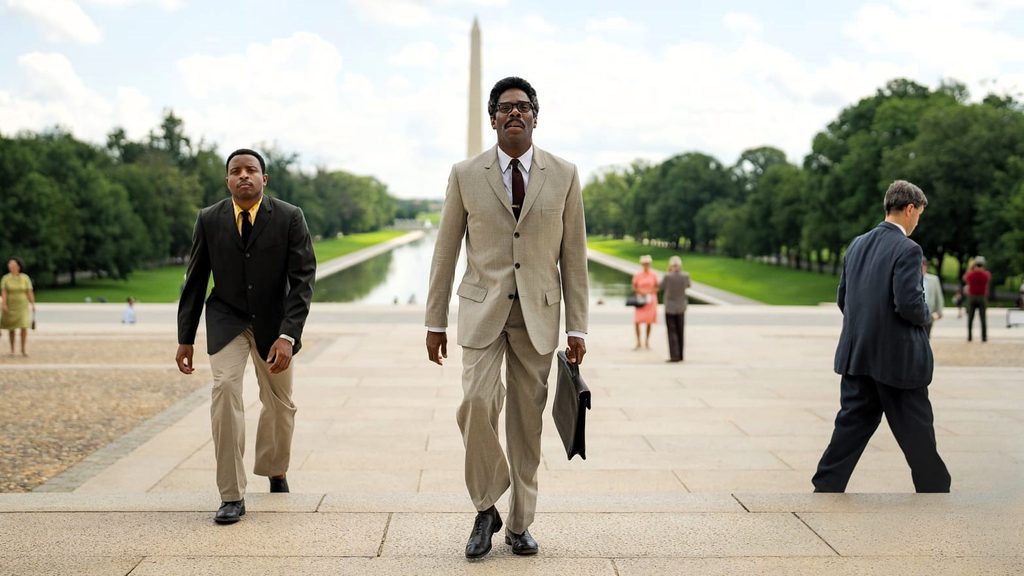
I’ve written about Colman’s wrenching portrayal of Mister in Blitz Bazawule’s The Color Purple. He also shines in the title role in George C. Wolfe’s Rustin, a biopic that reminds us of an activist who orchestrated the historic March on Washington in 1963.
Colman said, “Many Americans don’t know about Bayard Rustin. He absolutely, 100% was marginalized in the history books because he was openly gay, especially at a time when I think that there was more of a monolithic view on how we should move forward in this fight for civil rights and human rights and as African-Americans.”
“There was sort of a polish and gloss that was put on all of us and he was an outlier; wasn’t ‘sort of.’ He absolutely was an outlier.”
“His hair was shocking white and kind of like a hippie, in a way. He always had a shirt. In all these images, he always has his tie undone and sleeves rolled up ’cause he was really a worker, you know?”
“He wasn’t just the buttoned-up monument version of a civil rights leader. He was very much a worker, charismatic, fun, and wild in that way.”
“So, that was the thing that I also found out about him. And many Americans did not know about him.”
“I found out about him when I was about 19 years old when I was at Temple University studying journalism. Hello, my journalist friends (laughs).”
“I joined the African-American Student Union because I wanted to really do a deeper dive into my own cultural history. And his name came up in the middle of a conversation about the Civil Rights Movement and little things came up.”
“Like, ‘Oh, Bayard Rustin. He organized the March on Washington.’ I was like, ‘Oh, I never thought about someone who organized the March on Washington.’”
“‘Oh, yeah. He did it in seven weeks’ time with a lot of young activists.’ ‘What? Really?’ ‘Yeah. Oh, and he played the lute, he sang Elizabethan love songs, and recorded an album. He was on Broadway with Paul Robeson.’”
“‘What? Are you kidding me?’ ‘He was a star athlete when he was a teenager.’ ‘Get out of here.’ ‘And also, when he would tackle guys on the field, he would look them up afterwards and recite poetry to them.’”
“I was like, ‘Who is this man? How was it possible that I’ve lived up until 19 years old and didn’t know who this was?’”
Paul Giamatti – The Holdovers
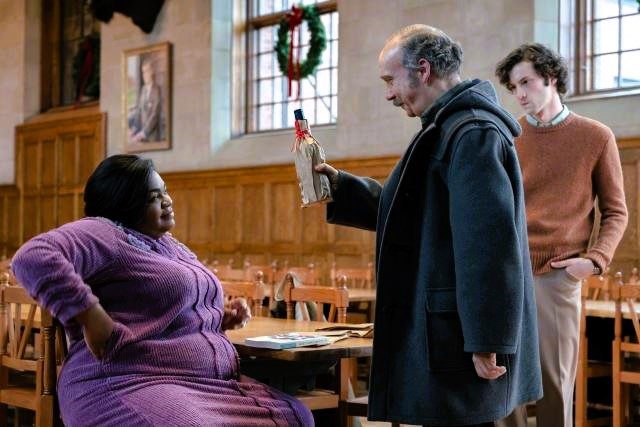
Almost two decades since Alexander Payne gave us Paul Giamatti’s misanthropic drunk in Sideways, the filmmaker delivers the actor as Paul Hunham, a curmudgeonly history teacher in a prep school.
Paul recounts how Alexander waited patiently for him to be available for his quietly effective comedy-drama about a teacher who is forced to remain on campus during Christmas break with a student and school cook, wonderfully played by Dominic Sessa and Da’Vine Joy Randolph, respectively.
“I’m not sure how long he (Alexander) had it (The Holdovers project) around for. Probably for a while before it ever got to me in any way, shape, or form. He basically said to me, ‘I’ve been working on something I think you’ll find interesting.’”
“It was inspired by a French movie from the 1930s called Merlusse, which is basically a similar idea of a guy who has to look after a bunch of kids over Christmas break. And I thought, oh, that sounds kind of interesting.”
“He said he’s (Paul Hunham) got some physical oddities. That was basically what he told me and I was like, ‘That sounds kind of interesting.’”
“Then he sent me an early draft, fairly early, and it didn’t change a huge amount from what he showed me right off the bat. He said, ‘I really had you in mind for this.’”
“I think for a lot of reasons he did because I had a background that matched some of what’s going on in the movie. And that was basically it.”
“We tried to make it a couple of years in a row but scheduling just never worked out. So, we could never land on starting it. He would say, ‘Do you think we could do it this year?’”
“And I’d go, ‘No because of my TV schedule.’ So that happened maybe two or three times and finally, we did it.”
Paul, who attended prep schools and then went to Yale, shared how his upbringing influenced his approach to Paul Hunham.
“I think it influenced my approach completely and quite a bit. I mean, in ways that I’m not even aware of,” Paul answered. “There are ways I’m conscious of but many ways I’m not even conscious of.”
“It’s funny – my whole family’s teachers. So that was a huge influence. And the way I feel about teaching and teachers and all of that.”
“And then actually specific teachers from the school I went to and from people who worked with my parents (Angelo Bartlett Giamatti and Toni Marilyn Giamatti, both educators – his dad was a Yale professor who became the university’s president) and stuff like that.”
“But it’s funny. For instance, the other day, a friend I went to high school with wrote to me and said, ‘Oh, it was so great. You were clearly completely imitating the head librarian from our school.’ And I hadn’t thought of that guy in decades.”
“I thought, oh, my God, I really was. And I didn’t even realize how much I was being the head librarian. Like exactly. And totally unconscious of it.”
“Was it mannerisms?” Paul was asked. He replied, “Yeah, I think something of the way the character was written already was lending itself towards this guy.”
“But there were definitely physical things that I was like, oh I made myself look like that guy.”
“I didn’t even think that I was looking like that guy and he had an eye like that, which is just coincidence but there was something about the way I carried myself and some of the way I was dressing. It was weird how the guy was right. I’d unconsciously been doing this guy.”
Da’Vine Joy Randolph – The Holdovers
Da’Vine’s take on Mary Lamb, quietly grieving over her son’s passing while cooped up on campus with a cranky teacher and a rebellious, smart rich kid, is unanimously praised.
She chatted about her character, eloquent in her wordless scenes: “So, this is interesting. I almost felt like I was a part of two movies. I felt like I was a talkie. I feel like it’s Singin’ in the Rain.”
“There was the talkies and then I really felt like I was a silent movie actress in many senses. Very early on, I don’t know if people know this, and I wanna share this, that Alexander sits right next to the camera. There are no monitors, there’s no video village.”
“He’s (Alexander) right in the room. And I remember our first couple of scenes, I was like, ‘So Paul, does he at some point leave?’ and he’s like, ‘No, this is it.’ And so, then I was like, okay I’m gonna just get comfy in this.”
“And then it almost became that I needed and wanted him there and relied on him being in the space. It just felt like we were in it together.”
“So, with that being said in those silent moments, I feel like half of the movie for I envisioned it or experienced it, I was doing a silent movie.”
“The interesting thing is, though there was no text, I guess in the process of how it went along for me, there’s a full monologue going on internally that is being stated.”
Jeffrey Wright – American Fiction
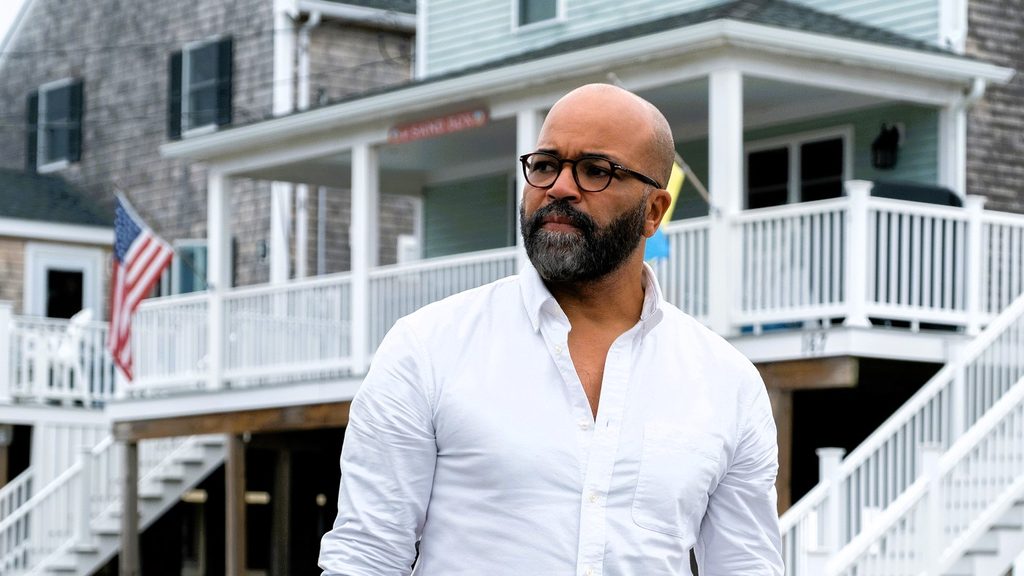
Jeffrey talked about being honored that first-time feature writer-director Cord Jefferson had him in mind as the frustrated novelist named Thelonious “Monk” Ellison. The winning satire on race and identity, especially in book publishing, was based on Percival Everett’s 2001 novel, Erasure.
Jeffrey’s author, frustrated with his career, jokingly wrote under a pseudonym a “Black book,” complete with stereotypes and lo and behold, the tome becomes a runaway bestseller.
“Cord sent me a wonderful invitation to this project,” Jeffrey began. “He sent me the script and a letter saying that he had read the novel and written the script and very early on heard my voice in his head as his character.”
“I did apologize to him for that (laughs). Because I know how tricky that can be. He also said, ‘I have no plan B.’ ”
“So that was pretty flattering. It happens occasionally but I don’t often get scripts that are designed with me in mind. Then when I read it, the membrane between my life and that character’s life was infinitesimally thin.”
“And it wasn’t really a matter of confidence. It was more necessity. I just said, yeah, I can tell this story. I know this man’s journey. Particularly his relationship to the family, the necessity of becoming a caretaker.”
“That was a very close experience or one that I knew probably too intimately. I think Cord can speak to that as well. But there were just a number of overlaps. The script was so finely tuned – the satire, the irony. I understood the music and I hopped on board.”
Jessica Chastain and Peter Sarsgaard – Memory
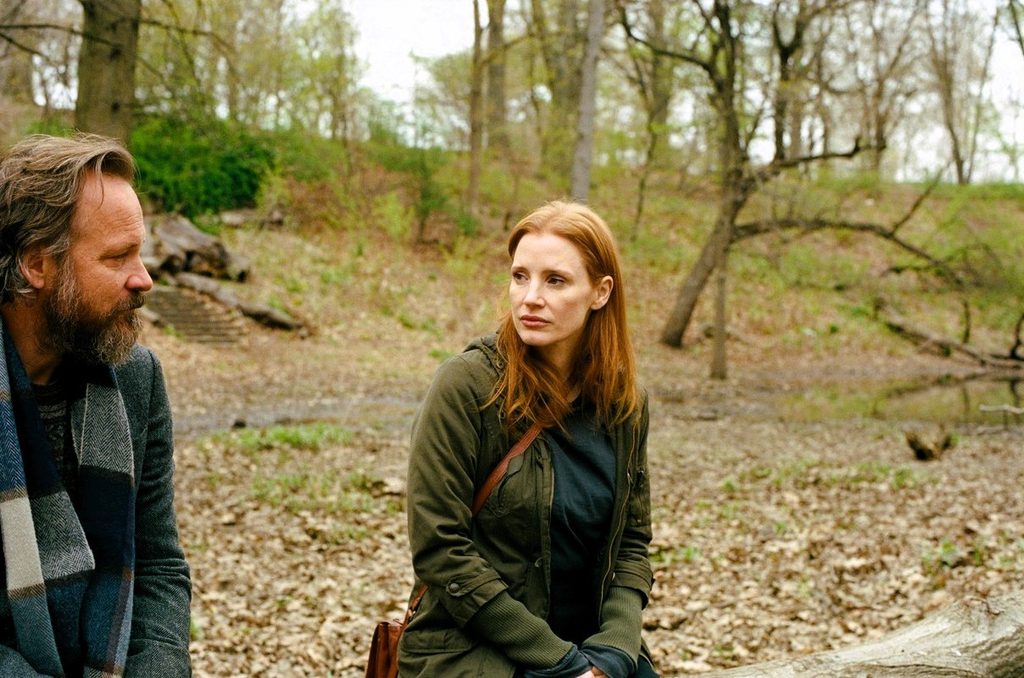
Jessica and Peter, two highly respected actors, deserve to be cited more widely for their portrayals in Michel Franco’s riveting Memory. She plays Sylvia, a recovering alcoholic and single mother working as a social worker; he tackles Saul, a man who has early-onset dementia.
Peter discussed his role, memory loss, and dementia: “A lot of people ask me about the dementia aspect. It’s really not him, the dementia, right? The dementia is just the condition. It’s the obstacle that he has that’s in the way of him getting what he wants.”
“So, while it’s important, it’s only as important as an obstacle is important. But that said, my uncle has CTE (chronic traumatic encephalopathy), which is a plaque on the brain from having played football and boxing.”
“And the way that the dementia dawned on us and dawned on him and then the diagnosis, there’s this thing that people don’t really think about, which is that you had dementia the day before you were diagnosed with dementia.”
“You’ve probably had dementia for the last couple of years and we’ve all been kind of living with it. What happens is someone gets the diagnosis and we all pathologize the person immediately. We can’t help it.”
“We want to protect them. ‘No, you can’t go outside.’ ‘No, you can’t do this.’ I was dealing with a man who, a big part of his struggle, was the way that the people around him were reacting to the diagnosis as well. And so, yeah, the dementia is important.”
“I talked to two gentlemen who had dementia over the phone, which seemed like the best way of doing it. And it’s phenomenal how much people remember and can do.”
“I really wanted to celebrate all that he could do – that was a big part of it. So, dementia is a big bucket that many different people could fit into. It’s not always the same. I wanted it to be as unique as the individual I was creating.”
Michel explained how she was familiar with addiction issues which are relevant to Jessica’s Sylvia character.
“I’ve been around people who suffer addictions, especially alcoholism, my whole life, so I know a lot about it,” the filmmaker said. “And the film starts with an anniversary because I’ve mostly attended anniversaries of people who are close to me.”
“And it came instinctively to write about Sylvia coming out, bringing her daughter and she’s a recovering alcoholic who has been off it for many years.”
“And it provides background, it immediately tells the audience a little bit about her past without it feeling like exposition, like fake.”
“It’s again what I was saying earlier, the film is about broken people. That AA meeting that we shot at the beginning of the film is a real meeting.”
“They agreed to speak on camera about their experiences but I felt that it would immediately provide the feeling. It’s not so much about information but the feeling of who Sylvia is and where she’s coming from.”
“People who are AA, they’re survivors and I have a big deal of respect for them.”
Jessica shared about filming in a real AA meeting: “I didn’t realize until I showed up. But it’s the way Michel works.”
“Your feet are held to the fire. You have to not look like the actor in the scene when everyone else is exposing this rawness, vulnerability, and humanity. You don’t want to be faking it.”
“And so how can you dig really deep into yourself and make it as real as possible for you as well? That’s how the whole film was for me in every aspect, not just the AA but also where Sylvia works.”
“That was an actual home where the residents lived there. I was serving them lunch and the camera would go around and catch moments of me interacting and working there.”
About the onscreen chemistry between him and Jessica, Peter pointed out, “Chemistry is something that exists because we are both open to listening. It’s just this happening back and forth. So, you can’t really create that.”
“If someone is not in tune with that, you can’t really create that. If someone is not in tune with that, it’s not going to happen. In terms of trust, trust is a very important thing to me.”
“And so, I tend to think you have it with someone until you lose it. At least that’s the way it is with me. Now, there are certain people who need a demonstration of something first.”
“And I never felt like Jessica was like that. I felt like if I was honest with her, straight with her, and clear about what I thought, that it would be there.”
“It was there to be had until it was destroyed so that’s it. It was easy. Both things just existed.” – Rappler.com
Add a comment
How does this make you feel?
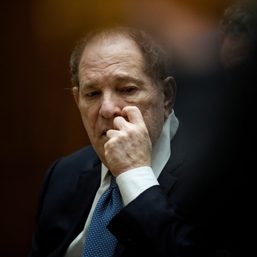




There are no comments yet. Add your comment to start the conversation.